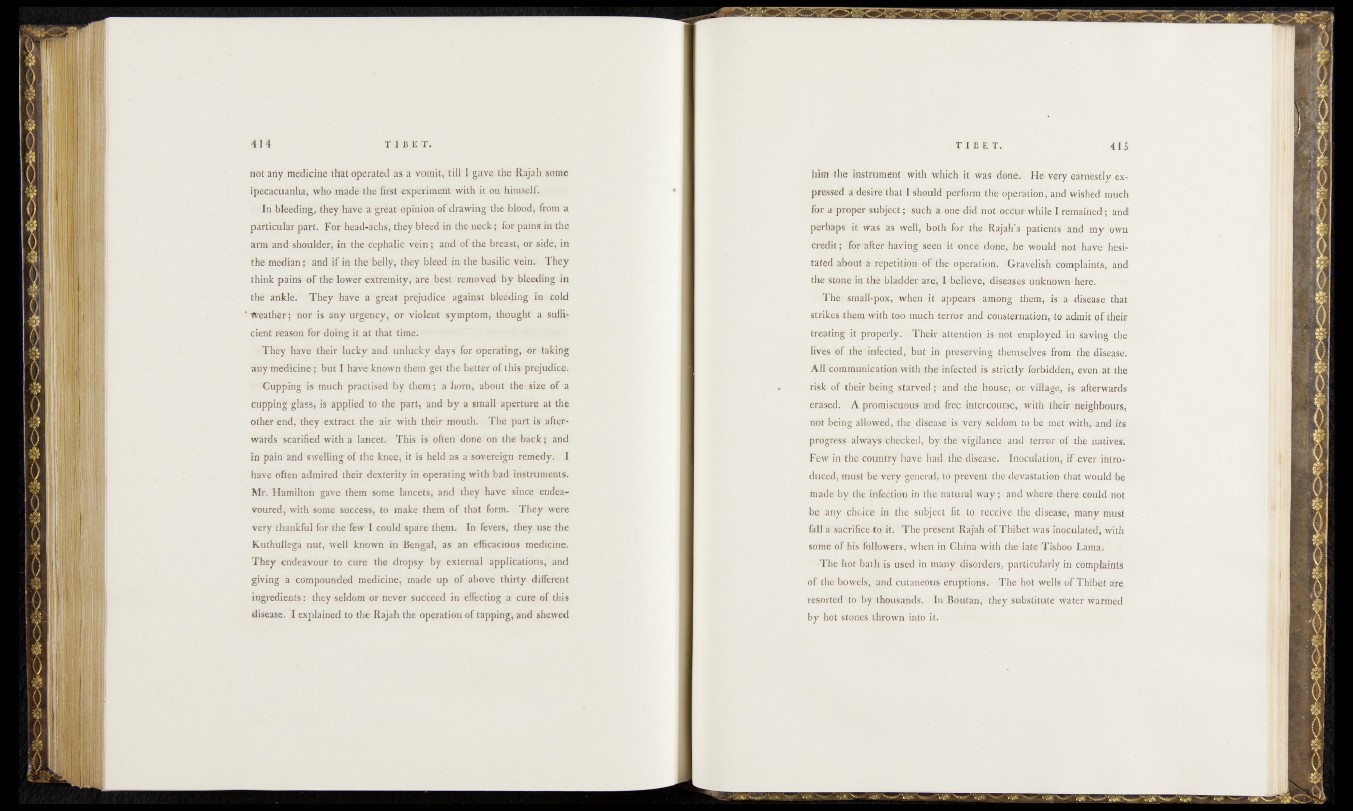
Bót any medicine that operated as a vomit, till I gave the Rajah some
ipecactiattha, who made the first experiment with it on’himself.
In bleeding, they have a great opinion of drawing the blood-, from a
particular part. For head-achs, they bleed in the neck ; for pain* in the
arm and shoulder, in the cephalic vein; and of the breast, or side, in
the median ; and if in the belly; they bleed in ifilrbasilic vein. They
think pains of the lower extremity, are best removed by bleeding in
the ankle. They have a great prejudice against bleeding in cold
weather; nor is any urgency, or violent symptom, thought a suffix-
dent reason for doing it at that time.
t They have their lucky and unlucky days for operating, or taking
any medicine; but I have known them get the better of this prejudice.-
Cupping is much practised by them; a horn, about the size of a
clipping glass; is applied to the part, and by a small aperture at thé
other end, they extract the air with their mouth. The part is after*
Wards scarified with a lancet. This is often done on the back ; and
in pain and swelling of the knee, it is held as a sovereign remedy. .1
have often admired their dexterity in operating with bad instruments.
Mr, Hamilton gave them some lancets-, and they have since endeavoured,
with some success, to make them of that form. They were
very thankful for the few I could spare them. In fevers, they use the
Kuthullega nut, well known in Bengal, as an efficacious medicine.
They endeavour to cure the dropsy by external applications, and
giving a compounded medicine, made up of above thirty different
ingredients: they seldom or never succeed in effecting a cure of this
disease. I explained to the Rajah the operation of tapping, and shewed
him the instrument with ■ which it was-done.»»He very expressed
a desire that I should perform the operation f and wished much
for a‘proper subject; such a one did not occur while I remained; and
perhaps it was as well,^ both-fof-the Raijah’s patients and myi’-qlra
credit; for after having Seen i#$héê'‘ 'dbfiè, he wbhld nobhaVe host1
tafed about-a repetition fof the jnpefadenv •'GravéiiSbxcomplaints, and
the stone in the bladder tare^i hélle ve,dise»ses unknown - here.
Thé | small*pox, when it appears among them, is| a disease that
strikes them with too much terror and consternation, to admit of their
treating it properly. Their attention is-not employed-in* saving the
lives of the iufected, but in preserving tb^m^elves from the diseased
All communication with the infected is strictly fofladdeni éven at the
risk of their being starved; and the-hoUsè, qr-ivilkge, is afterwards
erased. A promiscuous and free ■ iti{erc'ouEsey. vVitlf-tbeir neighbpurs,
BBPfeèitfg-allowed, the disease is very seldom,'to.,'.be men with, ampins
piöpess always-checked, hyrtfe'vigilance- and- ietrormf the natives;
Few in the country htsve had- the diseased Inoculation;: if everitftroh
duCed, must be Very j^eral, to prevent thh'deyakatio® thm vieuld be
made by the infection in theBMural way ;, and where there could not
be any choice in the subject .fit 4 to, receive the disease, many must
fall a sacrifice to it. The present Rajah of Thibet wa& ihöèülatéd|!w5th
some of his followers, when in China withithe la#e Tfehoo Tama.1
The hot bath is used in many disorders, particularly in complaints
of the bowels, and cutaneous* eruptions. The hot wells of Thibet are
resorted to by thousands. In Boutan, they substitute water warmed
by hot stones* thrown into it.